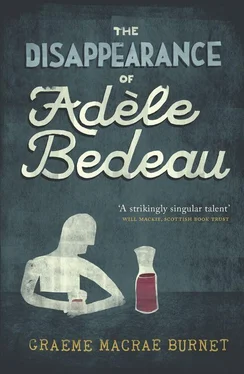‘Oh, good morning,’ Manfred said, trying to appear as if he had only just noticed her.
‘How are you?’ she said.
‘Well,’ said Manfred. ‘And you?’
The woman shrugged, widened her eyes slightly, as if the answer to Manfred’s question was self-evident. Manfred reached into his box and retrieved a handful of pamphlets. There was a pet product catalogue along with leaflets advertising offers at local supermarkets.
‘The usual,’ he said.
The woman proffered her own bundle in a show of solidarity. ‘I can’t believe they think anyone actually looks at this stuff,’ she said.
‘Actually,’ said Manfred, ‘studies have shown that direct mailings are by far the most effective form of advertising. In comparison, television or radio commercials are rather inefficient. Mail-outs can be much more easily directed at the target market. They’re cheap and can be easily adapted to local communities.’
The woman raised her eyebrows, rolled her eyes slightly. ‘Quite the smooth talker, aren’t you, Manfred Baumann?’ Manfred could feel his cheeks colouring. Despite the woman’s sardonic tone, he was pleased that she remembered his name.
‘I wouldn’t say that,’ he said.
‘Actually, I owe you an apology,’ she said. ‘I was very rude when we met before and didn’t introduce myself.’ She held out her hand. ‘Alice Tarrou.’
Manfred stuffed his mail back into his box and took her hand. ‘Manfred Baumann,’ he said.
‘Yes,’ she said, ‘I know.’
They moved towards the entrance of the building. Manfred held the door open for her. Alice indicated that she was walking in the opposite direction from town. Without thinking, Manfred accompanied her. It was sunny and there was the characteristic freshness in the air of the time of year. The grass verge that separated the apartment block from the main road glistened with dew. Manfred commented that it was a pleasant morning and Alice agreed. They walked in silence for a few steps. The heels of Alice’s shoes clacked on the pavement. Manfred glanced up at the windows above them. Anyone who happened to see them together might assume that they were husband and wife, or at least that they had spent the night together. It was quite thrilling. He pictured them sitting at the table in his kitchen; Alice, hair dishevelled, bundled in his robe eating a croissant, a pot of coffee bubbling on the hob. Manfred stole a look at her out of the corner of his eye.
‘You’re wearing the blouse,’ he commented.
‘So I am,’ said Alice. She glanced at him.
Manfred wondered if he should pay her a compliment. He was not in the habit of making personal comments to women.
‘It’s nice,’ he said.
Alice smiled. ‘Thank you.’
They had reached the end of the block. Alice turned left and doubled back around the building. Manfred followed her.
‘Is your car round here?’ Alice asked.
‘No,’ said Manfred. ‘I don’t drive.’ He had never seen any reason to learn.
‘Gosh,’ she said.
She asked where he worked and Manfred told her. Alice looked puzzled. He was walking in the opposite direction from the bank.
‘I have a meeting in Strasbourg this morning,’ he said. ‘I’m taking the train.’
Alice nodded. ‘Ah,’ she said. Manfred was pleased. The idea that he had a meeting in Strasbourg seemed to have impressed her. Then he was gripped by a fear that she would say that she too was on her way to Strasbourg and would offer him a lift. What plausible reason would there be to refuse? He would have to say that he was car-sick and preferred to take the train. That would make him appear feeble, however. Car-sickness was not the sort of thing a man who travelled to Strasbourg for business meetings would suffer from. In any case, what if Alice offered him a lift on another occasion, perhaps to drive to a country inn on Sunday afternoon? He would have to pretend that there was some medication he could take in advance in order to facilitate such a trip. It was in fact true that Manfred did not enjoy travelling by car. He suspected it brought on the migraines from which he suffered periodically.
Alice came to a halt next to a small silver sports car. It had a roof that could be taken down. She fished in her bag for the key.
‘You don’t seem like a bank manager,’ she said. Manfred was not sure what she was suggesting by this, but imagined she did not mean it negatively. People usually thought of bank mangers as officious, older men, old-fashioned in their appearance.
‘Thank you,’ he said.
Alice laughed. ‘You’re welcome.’
She unlocked the driver’s side door and tossed her bag on to the passenger seat. She climbed into the car and put the key in the ignition. She did not offer him a lift. Manfred stood on the pavement, unable to think how to end the encounter. Alice closed the door and wound the window down.
‘We should have that coffee some time,’ she said.
‘Assuredly,’ he said, immediately regretting his ridiculous choice of word.
‘How about tomorrow?’
‘Tomorrow?’ Manfred repeated.
‘Why not?’ said Alice. ‘Are you busy?’
Manfred shook his head. He wondered if he would be missed at the Restaurant de la Cloche.
‘Why don’t we make it dinner?’ said Alice. She suggested a restaurant. ‘Seven?’ she said.
Manfred nodded dumbly. She fired the engine and drove off. Manfred waved. Then he continued through the car park, past the children’s play park and exited on the opposite side, in the direction of the railway station. He looked at his watch. It was 8.25. He had spent less than ten minutes in Alice’s company. He walked purposefully into the station. He could not risk the possibility of Alice seeing him on Rue de Mulhouse. He liked to arrive early at the bank, but what of it if he was a few minutes late? Mlle Givskov had keys and was authorised to open the premises. He would still arrive by the time the bank opened to the public at nine o’clock. He headed through the underpass to the platform where the trains for Strasbourg departed. He contemplated buying a ticket, but decided against it. Anyone observing him would assume that he had a weekly ticket or was making a return journey. In any case, it was possible to buy a ticket from the conductor on the train.
There were around twenty people on the platform. Most of them stood hunched over L’Alsace, a briefcase at their feet. Manfred did not recognise anyone and nobody so much as glanced in his direction. He placed his own briefcase at his feet and stood with his back to the red brick wall of the waiting room. A train pulled in. Nobody got off. The commuters boarded in an unhurried fashion. Manfred remained against the wall. A whistle blew from the end of the platform and the train pulled away. Manfred picked up his briefcase and took the stairs back down to the underpass. Anyone seeing him leave the platform would assume he had disembarked from the train that had just left. He felt quite pleased with himself. He took the back way along Avenue de la Marne to the bank and arrived just as Mlle Givskov was opening up.
The morning passed swiftly. There was no further talk among the staff of the missing girl, at least not within Manfred’s hearing. Manfred greeted Carolyn cheerfully when she brought in his mid-morning coffee and successfully engaged in small talk. The girl seemed pleased to have the opportunity to pass a few amiable moments with her boss. Manfred ploughed through a backlog of loan reviews and applications. Decisions he had been putting off for days now seemed straightforward. If a person defaulted on their loan, it was their responsibility, not his. The bank could not be expected to throw money away willy-nilly.
By twelve o’clock Manfred had cleared so much work he decided to take his lunch early. If he bumped into Alice, it was perfectly plausible that he could have had his meeting in Strasbourg and returned by this time. The air was clear and Saint-Louis seemed to have shaken off some of its drabness. Manfred passed the little park at the Protestant Temple. Two old women were sitting on a bench with bags of shopping at their feet. They did not look up as Manfred passed. As he had some time on his hands, he decided to take a walk to the Rhine before he had lunch. He walked briskly, working up a light sweat on his brow. These last few months he had noticed a thickening around his midriff. If he weren’t careful, he would end up like Lemerre. As he strode along he twice thought he spotted Alice, but on both occasions it was just a woman dressed in a similar fashion. Most likely she did not work in Saint-Louis. Nevertheless, he found himself hoping to bump into her or even spot her driving past in her little sports car.
Читать дальше












